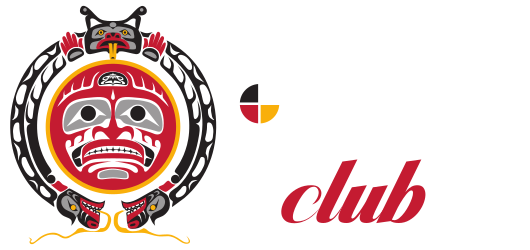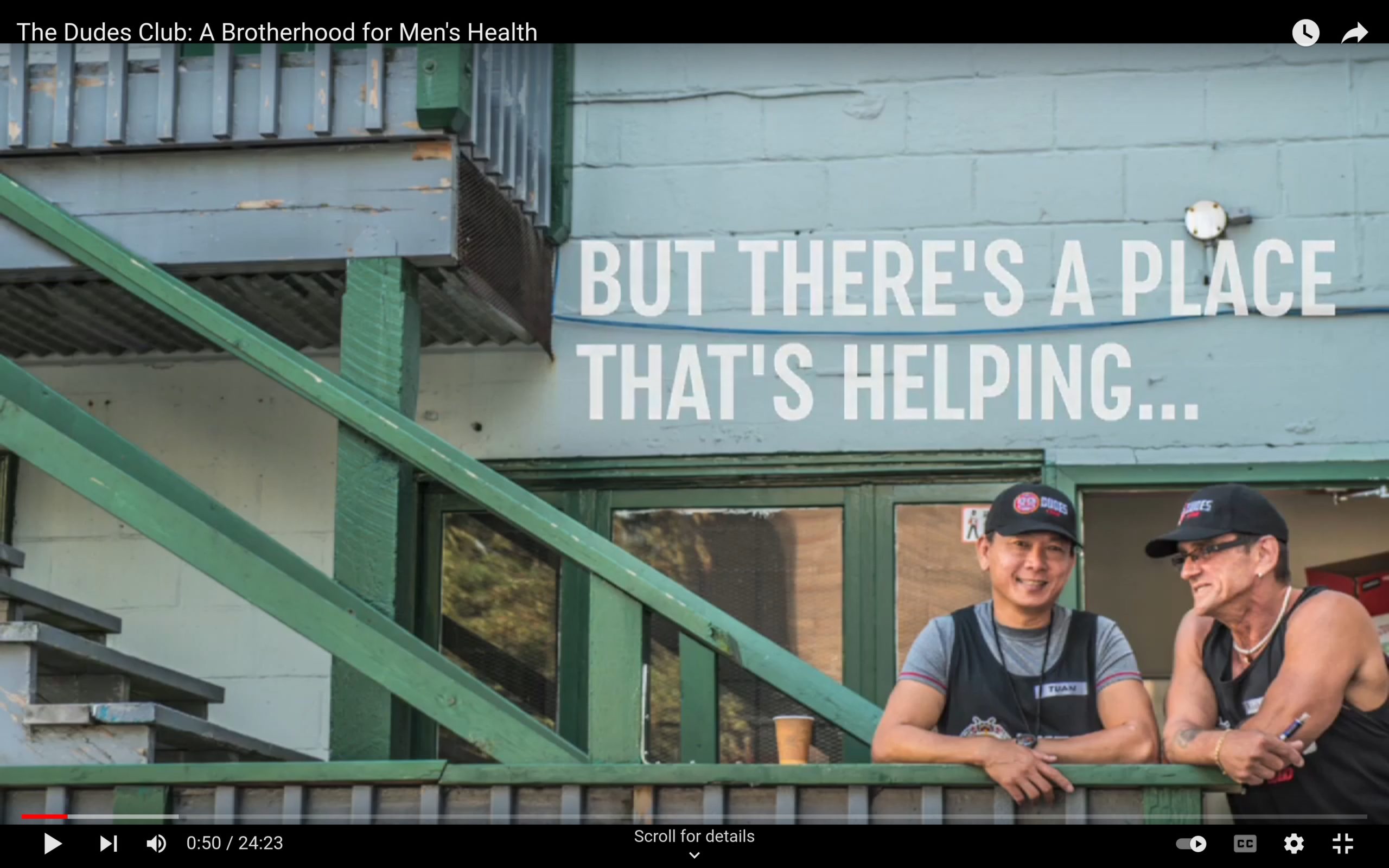The DUDES Club provides events and activities that focus on the spiritual, physical, mental, emotional, and social aspects of wellness in men residing on Vancouver’s Downtown Eastside. It focuses on connecting men with health care professionals and other support services, as well as instilling a sense of solidarity and empowerment within the community.
Blog
-
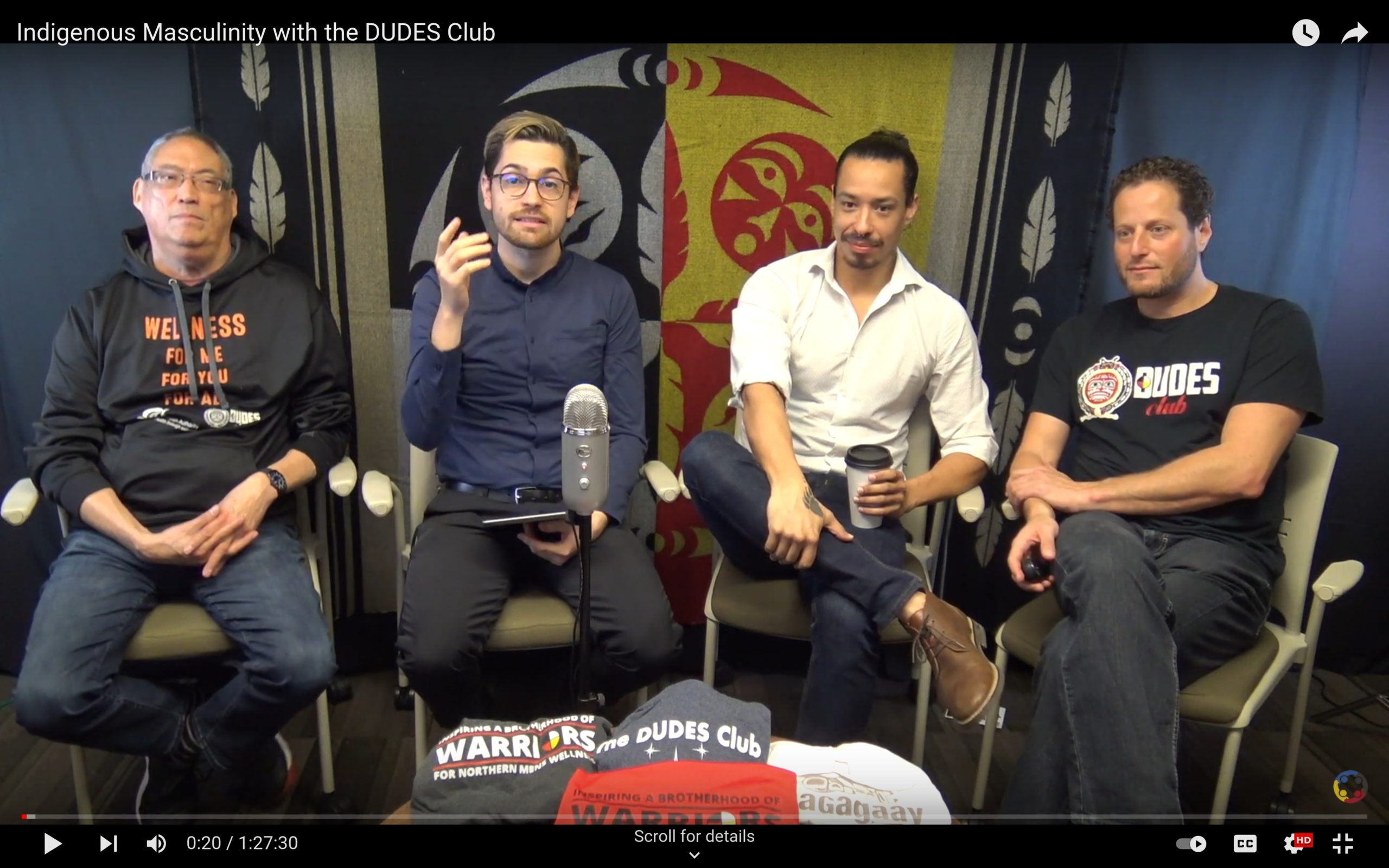
Indigenous Masculinity with the DUDES Club
A discussion about indigenous masculinity with DUDES Club Society team members.
-
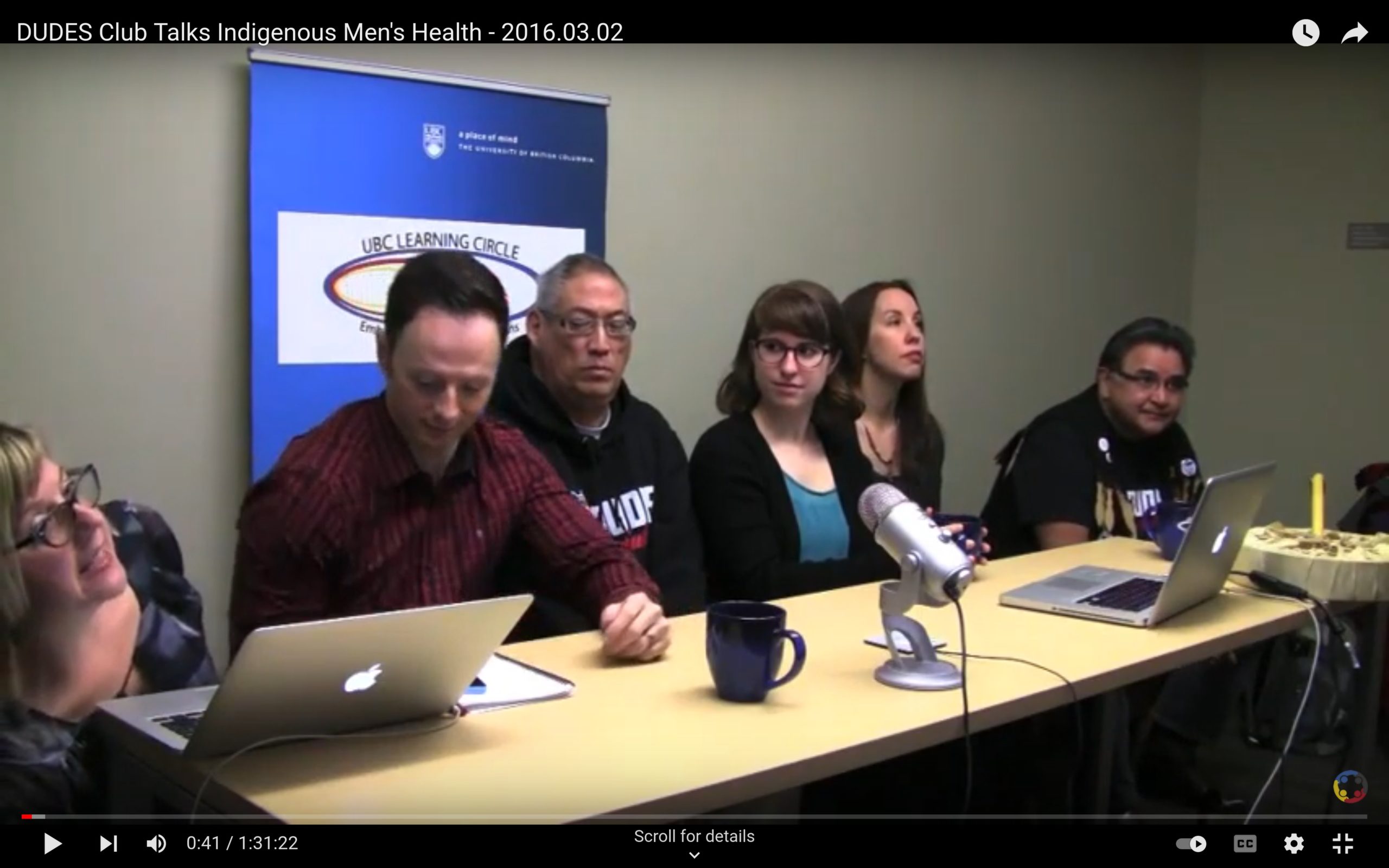
DUDES Club Talks Indigenous Men’s Health – 2016.03.02
Throughout the UBC Learning Circle session the Dude’s club, with help from Musqueam elder, Henry Charles, emphasizes the importance of traditional perspectives on health, such as the “Medicine Wheel” approach, along side of language and culture.
With garnered interest from the Movember Foundation, a research grant has allowed the research team to conduct an evaluation of the Vancouver program and to pilot this approach in Prince George, Smithers and on reserve in Moricetown. The DUDES club wishes to share their successful model with other communities.
-
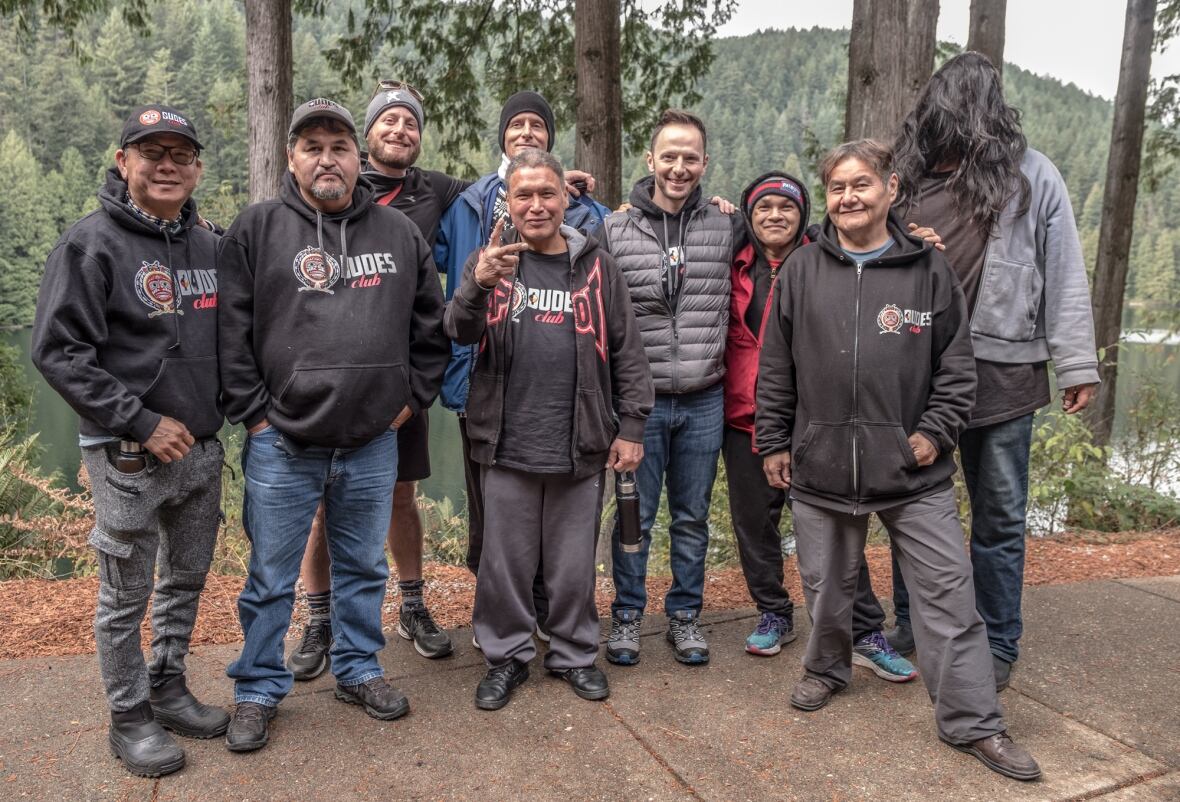
‘Leave your armour at the door’: How bonding is helping Indigenous men heal body, mind and spirit
Every two weeks, a group of 50 or 60 men cram into a makeshift bingo hall in Vancouver’s poorest neighbourhood, the Downtown Eastside.
They share a hot meal, play bingo, get free haircuts — then they get real about their health, talking about everything from prostate cancer to sexual abuse, in sessions led by doctors and nurses.
It’s called DUDES Club, an acronym for Downtown Urban Knights Defending Equality and Solidarity.
“We have this phrase, ‘Leave your armour at the door,’” said long-time club member Robert Chippeway, 54.
“You just leave all your toxic masculinity at the door, feel free and everyone’s at the same level. And that’s where the magic happens.”
Chippeway was in rough shape when he first stumbled upon the group in 2010. After a decade of living in the Downtown Eastside, he was an alcoholic with a cocaine addiction, living with HIV and Stage 2 cirrhosis of the liver.
“My mental health was all over the place,” he recalled. “I was powerless and I felt hopelessness.”

Robert Chippeway, 54, is an honorary DUDES Club Champion and credits the group with getting him back on his feet after years living with addiction. (Submitted by Robert Chippeway) But he was encouraged by the club’s welcoming atmosphere, so he kept returning. He credits his fellow dudes for helping get him back on his feet again. “It’s very important, crucial, to my recovery,” he added.
The program is now fielding inquiries from community health providers worldwide who wonder if the key to improving men’s mental health is as simple as good, old-fashioned male bonding.
Overcoming loneliness
The Vancouver Native Health Society started DUDES Club in 2010, after male patients at its HIV drop-in clinic repeatedly talked about being lonely.
“They all identified loneliness as their main mental health concern … it manifests in substance use, depression, anxiety, and PTSD,” said Dr. Paul Gross, a family physician and co-founder of the men’s health group.
“So, [we were] just trying to be a sanctuary, a safe space where men can come and connect.”

DUDES Club members are pictured during an outing to Loon Lake, B.C. (Jeff Topham/DUDES Club) In addition to the bi-weekly dinner and bingo, the men take outings to sports events and go camping.
But the backbone of the program remains discussions about health. Once a year, the dudes also gather for a wellness fair, where medical tests are offered.
Gross says the club’s social aspects are essential to coaxing men to open up about health.
“There’s an expectation, constructed over centuries, of what is expected of men. Stoicism and courage in the face of any suffering. And don’t show emotion, don’t show weakness. Don’t ask for help if you absolutely don’t need it,” said Gross.
“That narrative has been responsible, we believe, for a lot of the trend over the past decades in terms of toxic masculinity, gender-based violence and harassment in the workplace.”
Brotherhood of solidarity
About two-thirds of DUDES Club members identify as Indigenous.
Sandy Lambert, a member of Tallcree First Nation in Alberta and DUDES Club resident elder, says he’s met many Indigenous men who avoid hospitals and medical clinics, even if they require urgent care.
“They just didn’t feel any trust with the health-care system because of all the stigma and discrimination that happens. I thought, ‘Well, maybe, as a human being, I can help my brothers out there.’”
Persuading men to talk is no “overnight fix,” says Lambert, but he believes it helps to combine Western medical treatment with Indigenous healing traditions such as the medicine wheel.
“I know my people used to sit in the teepees, and the men and women would have their own talking circles. So, for generations and generations, we did that,” said Lambert.

Sandy Lambert is an elder external liaison for DUDES Club. (DUDES Club) Research suggests that the DUDES Club model shows benefits. A three-year study by the University of British Columbia found that participants’ mental, physical, emotional and spiritual health improves in the program’s safe, non-judgmental environment.
“Part of what we try to do is to encourage men to move along the spectrum from curious to serious about their health and wellness,” said Gross.
Elders and cooks receive honoraria, but the group relies primarily on volunteers, including Gross, which allows the club to operate on a budget of approximately $25,000 a year.
The program’s cost-effectiveness has led to the launch of satellite clubs in seven communities across B.C., including Kamloops, Smithers and Prince George, in addition to its 32 clubs in partnership with the First Nations Health Authority.
‘It reconnected me to my spiritual being’
Robert Chippeway still marvels at how the brotherhood helped him clean up his health, recalling a critical moment in his recovery that took place one evening at DUDES Club.
“I stood up there and said, ‘Hey guys, this is really good for me. I’m actually one-year sober today.’ The whole group applauded … I was super proud.”

Community members gather at a health fair hosted by DUDES Club in 2014. (Jeff Topham/DUDES Club) Chippeway has been sober for nearly four years, and he’s managing his HIV with medication. He also began exploring his Ojibway heritage, which he’d long felt alienated from.
“I’m more involved in singing and making drums and going to sweats and stuff like that. It reconnected me to my spiritual being,” he said.
Chippeway also reconnected with his family, eventually moving to Coquitlam to live with his brother, sister and father.
He was recently named a DUDES Club Champion, which means he helps organize dinners and plan outings for the men. Though he no longer calls the Downtown Eastside home, Chippeway still makes time for the dudes.
“Just the bonding, being in a room full of men with men, the messages from the doctor … it’s just amazing,” he said.
-
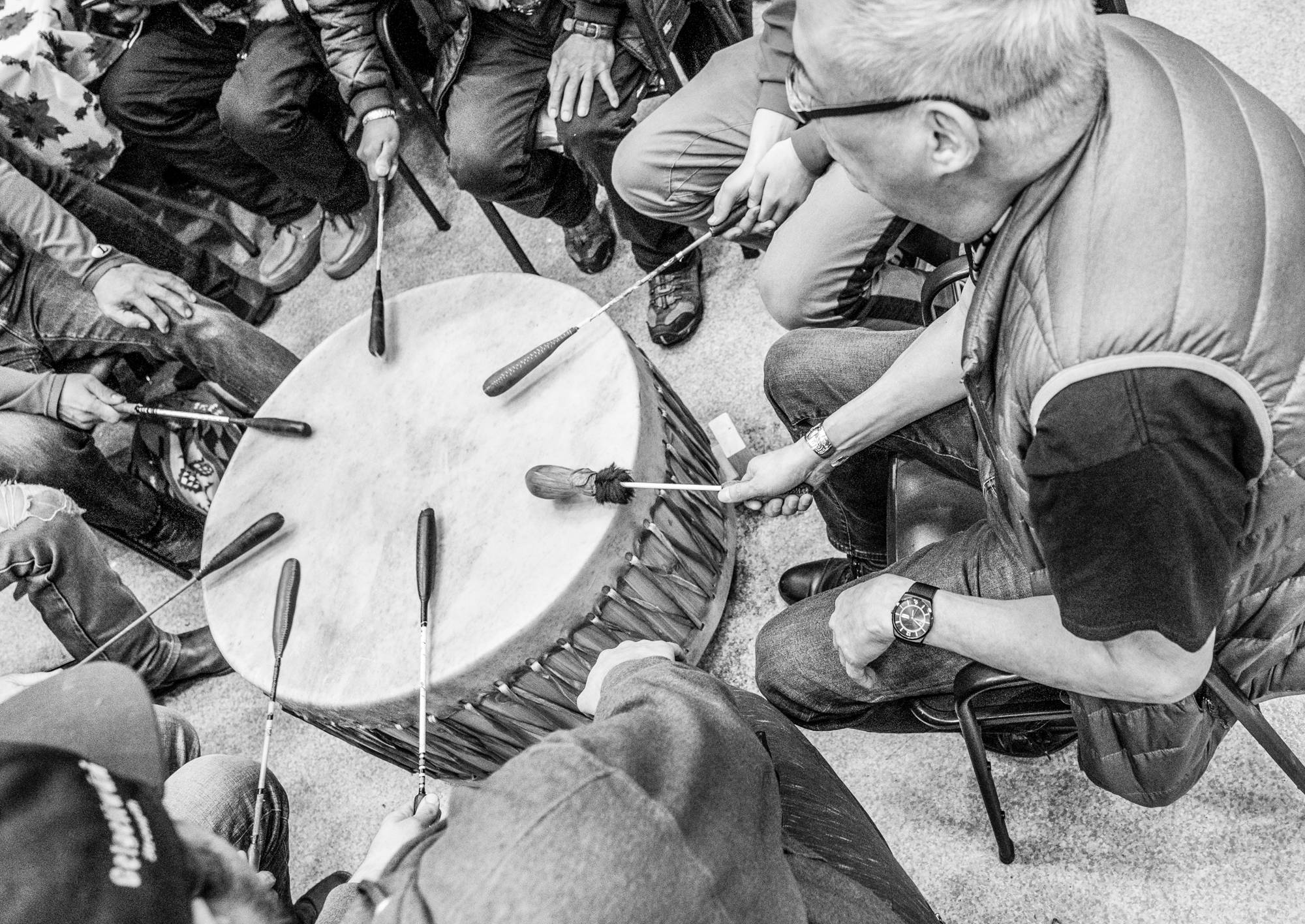
Lyana Patrick: Dudes Club and Movember – Indigenous men taking ownership of their health
Why do so many men grow moustaches every November? It started in Australia in 2003 when a small group of men grew moustaches to support men’s health and prostate cancer. From humble beginnings, the Movember movement has focused important international attention on issues like men’s mental health and suicide prevention, as well as prostate and testicular cancer.
But can a moustache save a life? According to Dudes Club members, it can.
Dudes Club is an innovative, community-driven men’s health program incorporating Indigenous approaches to healing and wellness. With help from Movember, a three-year research project with the Dudes Club demonstrated how a grassroots initiative could be mobilized to work by, for and with Indigenous men.
Research shows that men in general are less likely to seek medical attention than women, in addition to being three times more likely than women to die by suicide. Indigenous men’s health is further impacted by a lack of research on health services directed specifically at Indigenous men. In addition to the impacts of harmful masculine norms such as being “strong and silent,” independent and emotionless, Indigenous men endure the impacts of historical injustices through ongoing experiences of racism, violence and social exclusion.
As an Indigenous health researcher, I am interested in community health and well-being, particularly in urban areas. I study gendered experiences of colonization and their impacts on Indigenous peoples and communities. Through my research with Dudes Club, I worked with community partners, elders, health-care practitioners and Dudes Club members to better understand Indigenous men’s health and extend the model throughout British Columbia.
Dudes Club started in Vancouver Native Health Society in 2010. It has since grown into a national model for men’s health and well-being, with 40 sites throughout B.C. and two nationally.
During weekly “think tanks” at the Vancouver club, members choose topics for biweekly sessions. This gives members a sense of ownership over the process and empowers them to take control of their own health. The presence of a health professional at most sites makes health information accessible for men who don’t usually seek out such information.
A survey of 150 men at the Vancouver Dudes Club demonstrated that most came from a context of disenfranchisement, such as unstable housing, unemployment and poverty. In addition, many of the men live with complex histories of trauma, mental health and/or substance use issues. In the face of structural and systemic barriers, the research showed how important community connection and belonging are to mental, physical and emotional health.
Fourteen focus groups were conducted with men in Vancouver, Prince George and Smithers. In these groups, men described Dudes Club as a place where they can feel purpose and belonging, where they can work together to build peer support networks and engage in community advocacy. The research demonstrated that safety and trust are crucial for men taking ownership over their health. Dudes Club builds safety and trust because it is confidential, includes health professionals who understand members’ reality, and encourages strong peer relationships where respectful listening is the norm.
For men who attend often, the Dudes Club makes them feel more connected to others and improves their quality of life, meaning those who attend more often benefit more from the program. One elder described Dudes Club as a “safe haven.” Its informal motto — “leave your armour at the door” — demonstrates that Dudes Club is a safe space in which to challenge ideas of masculinity that say men have to be the “tough guy.” These ideas have prevented men from seeking health information and created disparities that have persisted for generations.
While Dudes Club is available to all men, many Indigenous men (63 per cent in the Vancouver Dudes Club) access the program through a partnership with the First Nations Health Authority. The presence of elders at Dudes Clubs is important, not only for the cultural knowledge they share, but for the humour and love they bring to the gatherings.
Ultimately, the Dudes Club is not just about men’s health and well-being. It is about the health of communities, women, youth, children and elders. Dudes Club reminds men that they are part of a community that values them even as mainstream social supports and health services fail them and their communities over and over again.
Dudes Club holds great value as a grassroots health promotion and community wellness model for all people who identify as male. It is a simple yet powerful example of grassroots community organizing that is helping us better understand how intersecting factors (including gender, culture and experiences of colonization) can impact people differently.
So, yes: Moustaches can save lives.
Lyana Patrick is assistant professor of Indigenous Health at Simon Fraser University. This article originally appeared online at theconversation.com, an independent source of news and views, from the academic and research community.
-
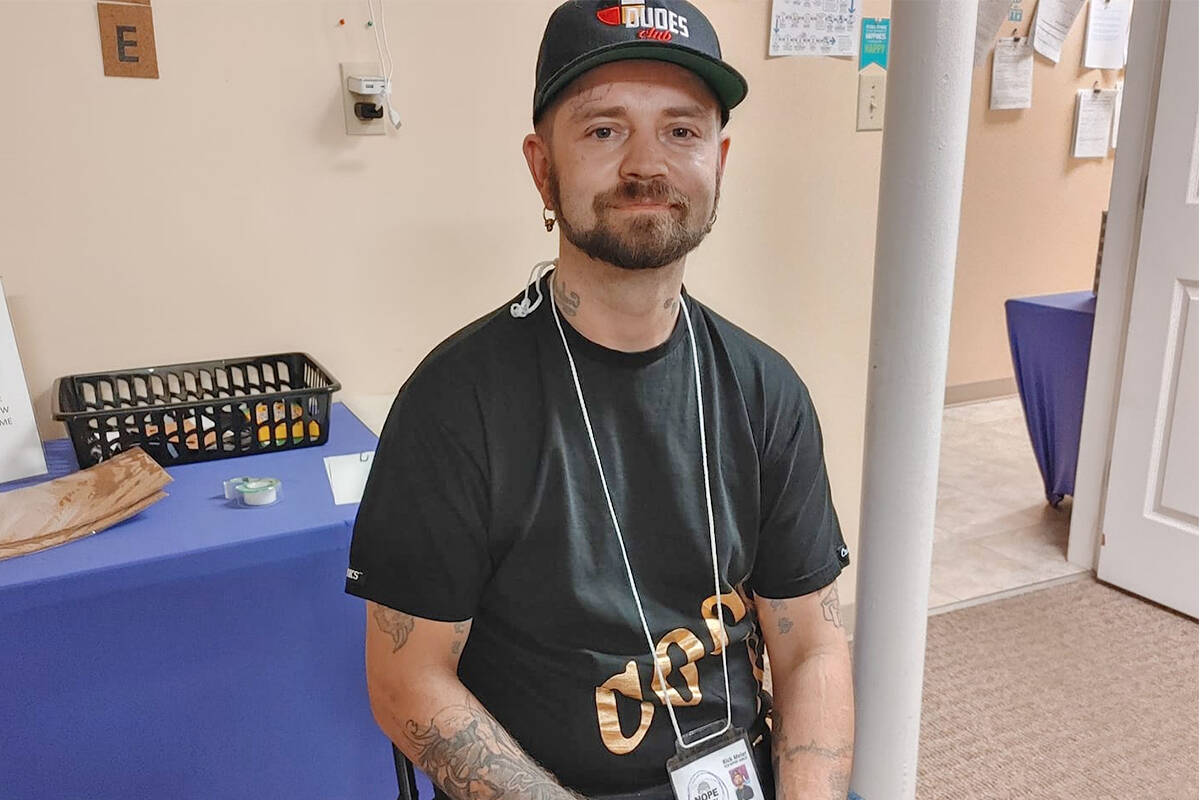
DUDES Club providing health and wellness support for men in Quesnel
There was a sense of brotherhood in downtown Quesnel as self-identifying men gathered to regain a sense of pride, purpose and fulfillment in their lives.
On Thursday, Nov. 4, DUDES Club facilitator Richard (Rick) Meier was excited to see how many guys would be stopping in.
The meeting starting at 7 p.m. was the second to be held indoors at the Northern Network of Peers for Equality (NOPE) office at 325 St. Laurent Avenue.
The first DUDES Club meeting in Quesnel was hosted at a city park on Sept. 16.
“It got started in east Vancouver, and it’s an Indigenous program that is about men’s mental health, physical health and overall well-being,” he said of DUDES Club.
“I was able to get in contact with them and get it started here, which I’m super grateful for because there is not a lot of support groups out there for men, especially in towns like Quesnel, so it’s good.”
Read More: Report ‘confirms’ mental health care is improving in B.C.
According to its web page, DUDES Club mission is to facilitate a participant-led community for men’s wellness with activity-based clubs that prioritize supportive relationships, engagement in healthcare and local Indigenous worldviews.
At the meetings, participants talk about “men’s stuff”, Meier said, without going into detail.
“Which is good because sometimes men need a place to get their stuff out,” he added.
“So we talk about men’s health and well-being, and programs that are here in town and other programs that can be started.”
Participants also chat about what activities they would like to do at the next bi-weekly meeting held Thursdays at 7 p.m. For example, one had suggested at their earlier meetings that they go gold panning, although winter could make it difficult.
“There is one DUDES Club further up north that’s doing a trail recovery program right now, so there are lots of opportunities out there,” Meier said, noting they are working with the group in Prince George.
Read More: B.C. adding addiction treatment, transition services, minister says
He has reached out and invited Indigenous elders to participate and lead their meetings with a land acknowledgment and traditional prayer.
DUDES Club participants wanting additional support can access peer support and advocacy through the NOPE office, a safe and inclusive space for all including women and members of the LGBTQIA2S+ community.
Access to food security, clothing, hygiene and harm reduction supplies and social system navigation is available.
“We started with the men because there was really a need for that,” said Kim Meier who helped co-find NOPE with her spouse Richard, Desiray Turrell and Brittany Bold-de-haughton.
When she first went into recovery, Meier was involved with Pathways Addictions Resource Centre in Penticton.
“It was so pivotal my recovery too, and I did a women’s group,” she added, noting she had also worked with the South Okanagan Women in Need Society (SOWINS) on their sex worker program.
Sex work is not often talked about in B.C.’s north, Meier said. The sex worker population in Quesnel is very hidden.
“I think there’s something in the works for women, but I don’t know what that looks like as of yet.”
-
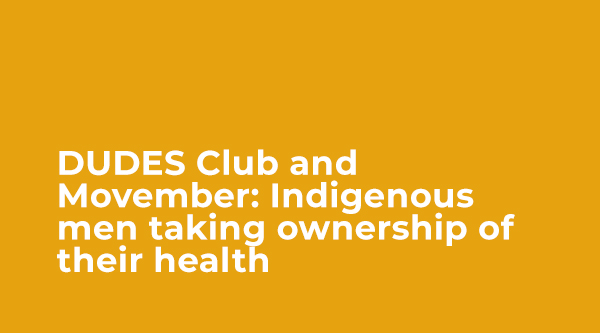
DUDES Club and Movember: Indigenous men taking ownership of their health
Author: Lyana Patrick, Assistant Professor of Indigenous Health, Simon Fraser University
Why do so many men grow moustaches every November? It started in Australia in 2003 when a small group of men grew moustaches to support men’s health and prostate cancer. From humble beginnings, the Movember movement has focused important international attention on issues like men’s mental health and suicide prevention, as well as prostate and testicular cancer.
But can a moustache save a life? According to DUDES Club members, it can.
DUDES Club is an innovative, community-driven men’s health program incorporating Indigenous approaches to healing and wellness. With help from Movember, a three-year research project with the DUDES Club demonstrated how a grassroots initiative could be mobilized to work by, for and with Indigenous men.
Indigenous men’s health
Research shows that men in general are less likely to seek medical attention than women in addition to being three times more likely than women to die by suicide. Indigenous men’s health is further impacted by a lack of research on health services directed specifically at Indigenous men. In addition to the impacts of harmful masculine norms such as being “strong and silent,” independent and emotionless, Indigenous men endure the impacts of historical injustices through ongoing experiences of racism, violence and social exclusion.
-
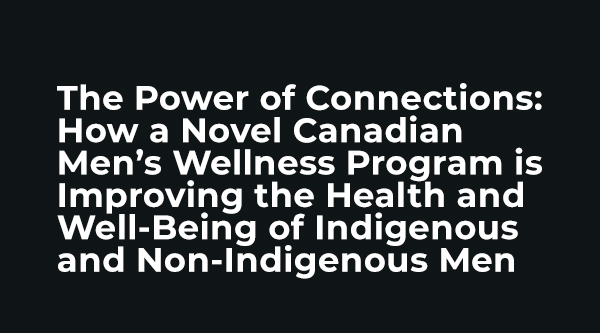
The Power of Connections:
How a Novel Canadian Men’s Wellness Program is Improving the Health and Well-Being of Indigenous and Non-Indigenous Men
Iloradanon Efimoff *
University of Manitoba , Canada , efimoffi@myumanitoba.ca
Lyana Patrick *
Simon Fraser University , Canada , lyana_patrick@SFU.ca
Viviane Josewski
University of British Columbia, Okanagan, Canada , viviane.josewski@ubc.ca
Paul Gross
University of British Columbia, Canada , paul@dudesclub.ca
Sandy Lambert
DUDES Club Elder and External Liaison , Canada , sandy@dudesclub.ca
Victoria Smye
Western University , Canada , vsmye@uwo.caAbstract
The DUDES Club is a novel men’s health and wellness organization founded in 2010 in Vancouver, BC. Since 2017, the DUDES Club has rapidly expanded in Northern BC and, with the help of a partnership with the First Nations Health Authority, has grown to include 40 sites in British Columbia and 2 sites nationally. In this study, we analyze data from interviews (n = 5) and 15 focus groups (n = 101) conducted as part of a program evaluation with DUDES Club members, Elders, providers, and health care professionals. We focus on men’s experiences with the DUDES Club to identify four main themes in the data: brotherhood and community, accessible health care information, disrupting colonial constructions of masculinity, and systemic and structural challenges. We conclude with policy recommendations.
Every two weeks in Vancouver’s Downtown Eastside (DTES) neighbourhood, a group of men gather together for a few hours in the evening to share food and ideas, to learn and have fun, and to take a break from their often-difficult daily realities. This unlikely gathering started 10 years ago when frontline workers recognized the need for a safe and supportive space for men to gather. What started as a support group organized around the Positive Living Outreach Program at the Vancouver Native Health Society has blossomed into a national model for men’s health and well-being. This group is called the DUDES1 Club.
Indigenous Peoples in Canada experience a disproportionate burden of both mental and physical health issues (Nelson & Wilson, 2017; Rotenberg, 2016). These health inequities must be understood in light of colonialist and neo-colonialist practices (such as residential schools, the Sixties Scoop, and the overrepresentation of Indigenous children in care), widespread poverty, homelessness, and racism (Currie et al., 2012; Patrick, 2014; Press, 2019; Spence et al., 2016). In healing from past and ongoing effects of colonization, culture is a key source of strength for many Indigenous communities (Assembly of First Nations & Health Canada, 2015; Gone, 2013). An emerging body of evidence for “culture as treatment” points to the significance of interconnectedness in healing and underscores the need to incorporate Indigenous cultural practices into health programming (Barker et al., 2017).
Generally, men are less likely to seek medical attention with regards to their mental well-being. This tendency can have tragic consequences: Men are 3 times more likely to die by suicide than women (Goldenberg, 2014; Statistics Canada, 2019). Indigenous men are at an even higher risk for suicide (Kumar & Tjepkema, 2019). Men’s high rates of suicide might, in part, be due to inadequate diagnosis and treatment of men’s mental health issues (Oliffe et al., 2010; Wide et al., 2011). To this end, the American Psychological Association issued its first guidelines for practice with men and boys (Pappas, 2019). Conformity to dominant ideas of masculinity that stress male independence and fearlessness (“the strong silent type”) may further lead men to disregard their health and avoid seeking timely health care (Goldenberg, 2014, p. S142), which is a concern that is particularly pressing for older men (Tannenbaum & Frank, 2011).
-
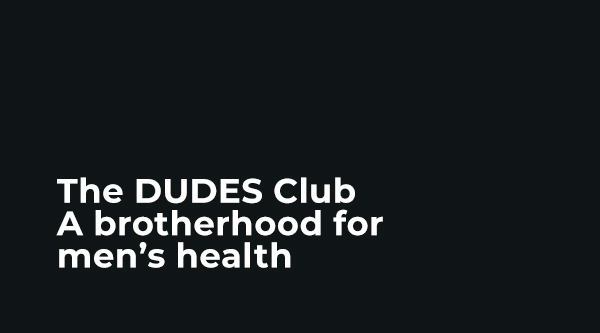
The DUDES Club a brotherhood for men’s health
A brotherhood for Paul A. Gross MD CM CCFP Iloradanon Efimoff Lyana Patrick Viviane Josewski Keith Hau MSc Sandy Lambert Victoria Smye RN PhDmen’s health.
Abstract
Problem addressed In Canada, there are few health promotion programs for men, particularly programs focused on indigenous and other men marginalized by social and structural inequities.
Objective of program To build solidarity and brotherhood among vulnerable men; to promote health through education, dialogue, and health screening clinics; and to help men regain a sense of pride and fulfilment in their lives.
Program description The DUDES Club was established in 2010 as a community-based health promotion program for indigenous men in the Downtown Eastside neighbourhood of Vancouver, BC. Between August 2014 and May 2015, 150 men completed an evaluation survey developed using a logic model approach. Responses were analyzed based on the 4 dimensions of the indigenous medicine wheel (mental, physical, emotional, and spiritual). Evaluation results demonstrated high participant satisfaction and positive outcomes across all 4 dimensions of health and well-being: 90.6% of respondents indicated that the DUDES Club program improved their quality of life. Participants who attended meetings more often experienced greater physical, mental, and social benefits (P < .05).
-
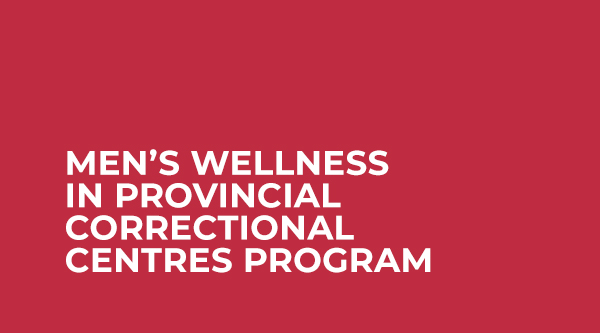
Mens Wellness Program Evaluation Report
Indigenous people in Canada historically had strong and rich traditions of land-based health and wellness and experience, knowledge, and tools for healing. Oral history suggests the population was characterized by good health and longevity, enhanced by ceremonial and spiritual practices for well-being. Contact with European settlers and colonial policies and practices of systemic oppression of Indigenous culture, language and traditions, residential schools and the “60s scoop” resulted in intergenerational trauma and marginalization of Indigenous communities and continue to have major social, economic and health consequences today. Compared with the general population, Indigenous men are at greater risk of depression and suicide and suffer a disproportionate burden of other mental health issues. Further, men are generally less likely than women to seek help with health issues and they face many barriers when accessing appropriate mental health services. As a result, men suffer in silence far too often. Research indicates many benefits of men’s-only spaces for health engagement to help promote healthy lifestyles, connections and strong mental health among men.
Created in 2010 by men living in Vancouver Downtown Eastside, the DUDES Club Society is aimed at building solidarity and brotherhood between members and promoting men’s health through education, dialogue, and health screening clinics. Currently, the program operates men’s group sessions in more than 40 communities across British Columbia. Since 2019, the program has been delivering its services in several correctional facilities.
The purpose of the project is to conduct evaluation of the Men’s Wellness in Provincial Correctional Centres program implemented by DUDES Club Society. The evaluation was focused on the portion of the program activities contracted through Provincial Health Services Authority. The evaluation was started in March 2021 and completed in September 2021, and examines program activities implemented from January 30, 2019 to August 30, 2021 at three correctional facilities, including: Prince George Regional Correctional Centre (PGRCC) Vancouver Island Regional Correctional Centre (VIRCC) and Nanaimo Correctional Centre (NCC).
